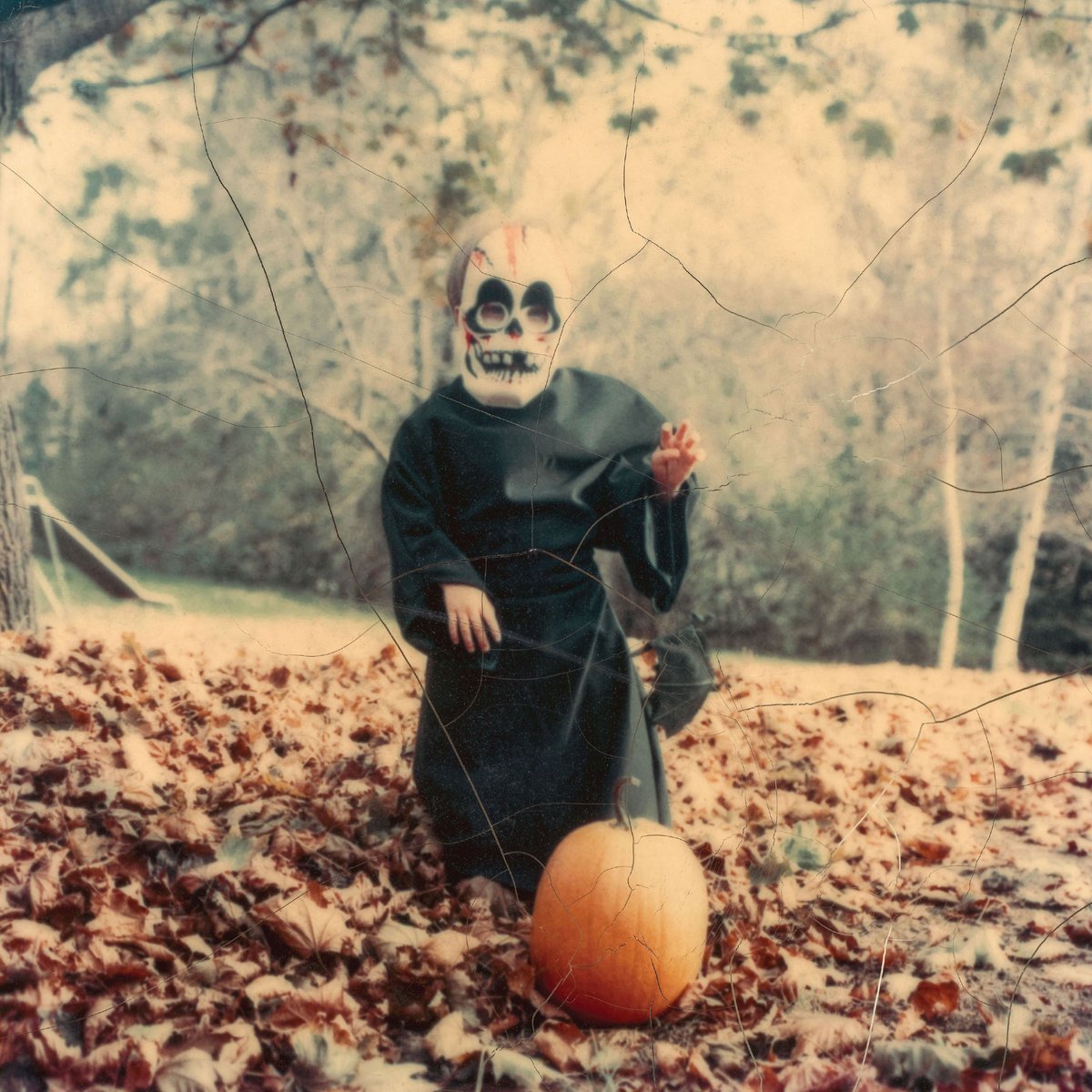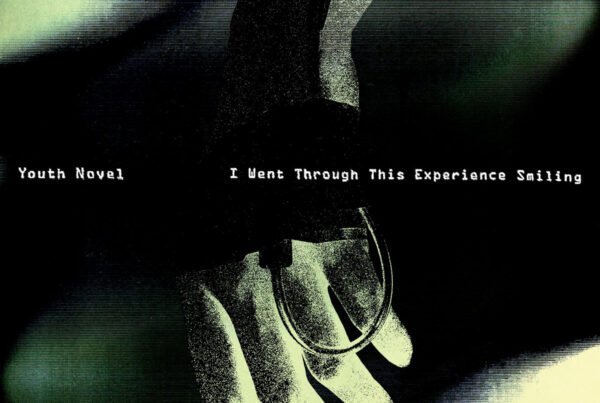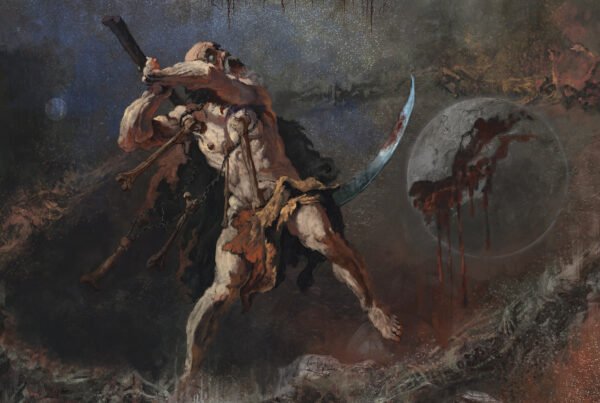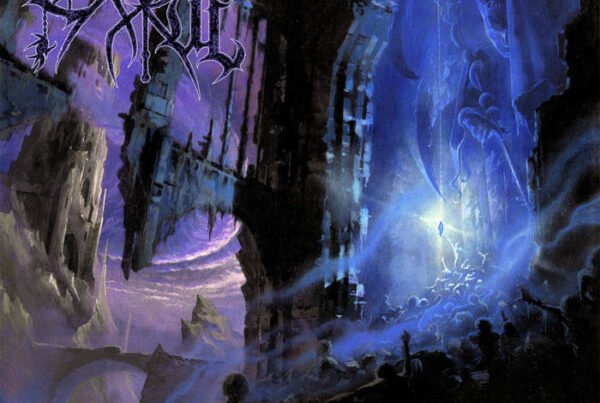Matt Jencik and Midwife explore the meaning of eternity, giving voice to the living and the dead on the haunting, cautionary Never Die.
Release date: July 11, 2025 | Relapse Records | Facebook | Instagram | Bandcamp
Loneliness and being alone are two very different aspects of living a life, and they are so intertwined that it’s hard to describe what either actually is. Whether we like it or not, we are defined by our relationships with others, and this is what will linger long after we go. Choosing to be alone is an act of selfishness. Loneliness, on the other hand, is a reactionary response: being blocked out of human interaction is akin to emotional death, and can unsurprisingly lead to the ultimate end.
Never Die, the new album from Chicago area artist Matt Jencik and Midwife, the slowcore project of New Mexico-based Madeline Johnston, is a record that explores these relationships, or lack thereof. It’s an album of profound loneliness, in the sense that one lives a life distant from others, even in the midst of a crowd. It’s an album about friendship and family and relationships and how all of this shapes who we are. And, of course, it’s an album about death. Lots and lots of death.
First song “Delete Key” acts as an ambient alarm. It’s telling you to wake up and face the dawn, even if you know today will be just as shitty as the rest of them. There’s a spiritual essence to it, like the grace of a morning prayer. The dissonant chord progression is at odds with the major key melody of Madeline Johnston’s voice, like she’s telling you to expect almost all your prayers to go unanswered. And that’s because we are all alone.
Jencik is responsible for all of the lyrics and music on the album, so it’s interesting to see the interplay between the two artists, Midwife serving as a not-so-passive observer. The lyrics – and the music – are soaked in isolation and despair, and yet both artists seem to play very different parts. Jencik is earth-bound and desperate to grab onto something tangible to keep from drifting off into the heavens. Midwife is already ahead of him, lingering above, consoling him that life after death isn’t necessarily a bad thing.
Many of the songs act as parables for this struggle between life and death, of loneliness and belonging. “Don’t Protest (Too Much)” features great shimmering shoegaze guitars, multi-layered strings and Johnston’s breathy dream voice over Jencik’s baritone. It’s an ominous half-step groove, dripping in reverb, cavernous, a wispy percussion piece. It seems to be about a person getting killed at a protest and then their ‘body’ being used as a piece of performative leverage, in whatever way you can interpret that. It could be a martyr; either way, it shouldn’t have happened. Jencik’s voice sounds earth-bound; Midwife’s sounds as if it’s already crossed the ether.
On “Flower Dragon”, Jencik keeps with the minimalist approach to the construction of the songs, and does a powerful job of juxtaposing hope within an atmosphere of despair. For a song that’s so sonically sparse, both in it’s instrumentation and construction, it fills the room. Jencik’s lyrics are tightly coiled stories of death, and echo the poetry of the music:
‘He was on the run from the cops
and you were in bloom
just like
a flower dragon‘
Much of the power on Never Die comes from lyrics such as these. Each stanza is short and concise, like the strong roots of a live oak, just twisting with power beneath the dirt. There’s an innate sadness to the narrators, of course; but all are infused with a kind of supernatural strength. Midwife‘s ethereal vocals just add an extra layer of heartwood to the tree.
For instance, on the gothic “The Last Night,” Jencik’s spoken lyrics drip with despondency. ‘The last night I felt alive we played the most dangerous game,‘ he sings over a bed of Casio CZ-101 synth swells. ‘The 8 ball just wouldn’t sink, but at least I was alive.‘ There’s an earnestness to these spoken memories, as if he’s inviting Midwife to sing him out of the hole he finds himself in. The song lingers and hangs, like wind blowing through the trees, carrying the mist. The lyrics tell a story of a lifetime in two stanzas, and they both die. Jencik seems to desperately want to hold onto the life he has; Midwife seems to remind him why he felt that way.
“Bend” continues with the gothic, dark ambient groove dropped as “The Last Night” eases out of its five minutes of pain. Two distant chords, Midwife’s maligned vocals drift over a bed of ambience to paint a picture of pain and confusion. The chords bend into each other, perhaps a literal expression of the name. How many times do we need to bend to life in order to accommodate the needs of others at our own expense, the song seems to ask. In what space does one need to be in order to feel alone without feeling as if you are betraying those around you? The outro falls to the bottom of the well, conjuring up the existential pain Ethel Cain brilliantly exposed on Perverts, and the answers are left unanswered.
The title track is an on-the-nose song about death. It keeps with Midwife‘s dark sense of humor, even if all of the lyrics on the album were written by Jencik. ‘I HOPE YOU DON’T DIE, I HOPE YOU DON’T PASS,‘ she sings – pleading that there’s much more to say. It’s a universal feeling, one shared by all of us, even if we aren’t writing songs about it. Navigating our own journeys, while trying to honor the journeys of those closest to us can sometimes paint us into a corner where we never feel we’re doing enough.
Following “Never Die” comes one of the album highlights: “Only Death is Real.” It’s a song about fever dreams, Ambien, metalheads and death, only one of which is ‘real’. The outro, like on “The Last Night,” lingers like the soot from a cremation, specks of incarcerated flesh drifting on the wind like pollen. ‘The metalheads were right: only death is real,‘ sings Johnston. Sometimes the ones we push out to the edges of acceptance end up being the ones with all the right ideas. Horns up for the metalheads.
“September Goths” and “Rickety Ride” close out the album. The former builds on the old-school 4AD vibe that “The Last Night” laid, and helps with the pacing of the album. The outro of “September Goths” is a one-minute Cure-like instrumental, a long sleigh ride into the depths of winter. On “Rickety Ride,” the chorus-drenched guitar, the simple-programmed drums, a melody played on the slide, and Jencik’s hopeful baritone over Johnston’s spectral voice, make the song sound like a 21st-century call-back to “Purple Rain.” After Jencik sings his story, the key changes and a single drone on the synth brings the album to a close.
Never Die is an act of acute observance between kindred souls. Both Jencik and Johnston have shed light from the music on to the darkest corners of our psyche. There’s a strong sense that nothing happens in a vacuum – that our decisions have consequences, and whether we like it or not, we’re never alone. In the end, the songs on Never Die aren’t built to stand by themselves; but when they are leaning on each other like brothers and sisters from the same family, they remind us that we only live as long as our memories are carried in the hearts of others. And the lucky ones live forever.






